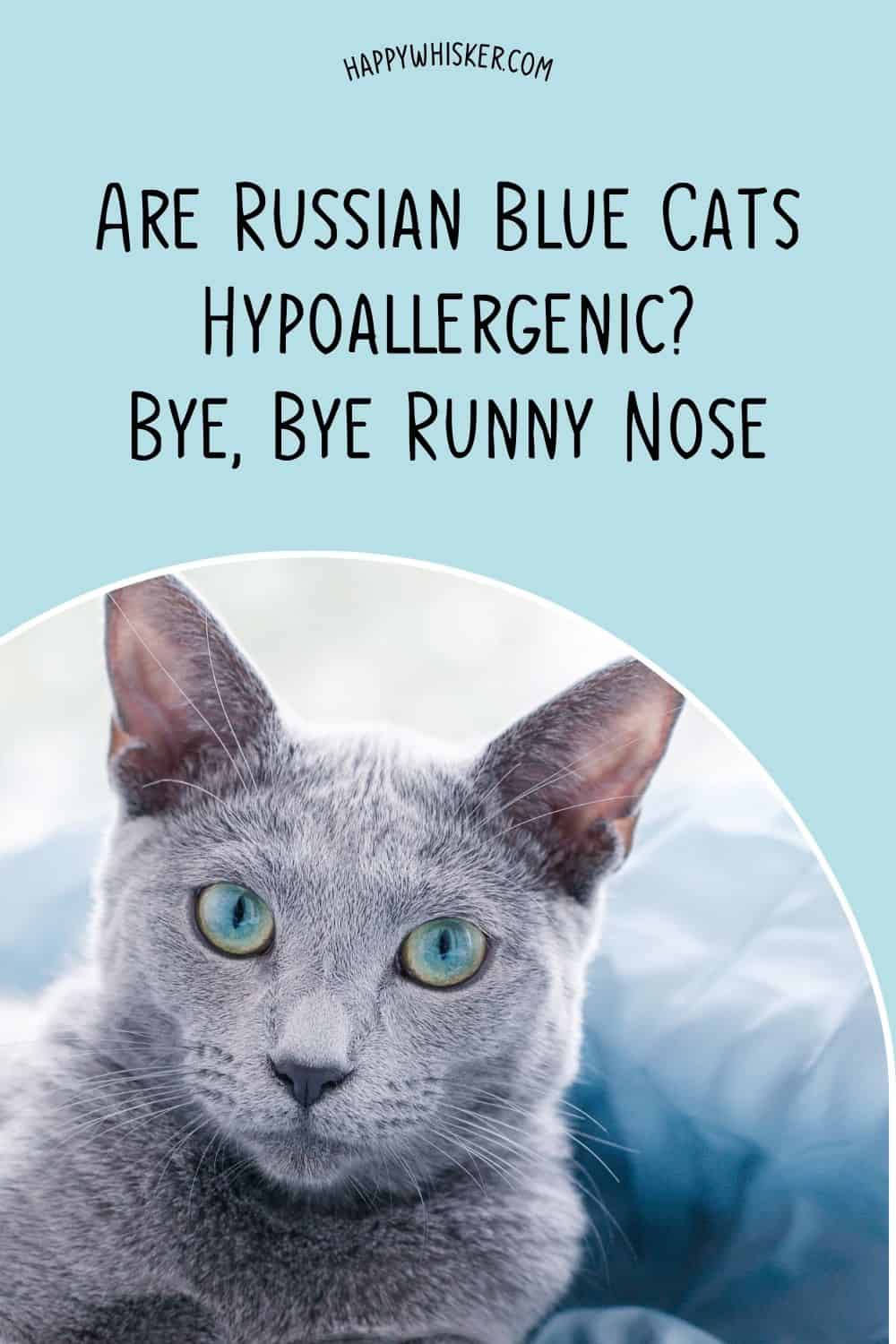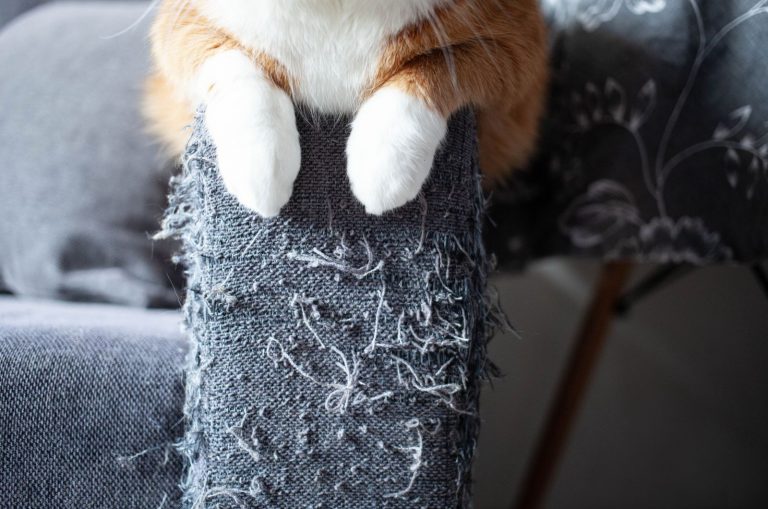Are Russian Blue Cats Hypoallergenic? Bye, Bye Runny Nose

Did you know that more people are allergic to cats than to dogs? The number of people allergic to cats is twice as high! How crazy is this? That explains why many people are searching for hypoallergenic cat breeds.
Are Russian Blue cats hypoallergenic? Are they a good choice for future cat owners prone to cat allergies? Many people will tell you that Russian Blue cats are great cats for people with mild allergies!
If your allergy symptoms are mild to moderate, you can have a Russian Blue cat running around your house, with minor lifestyle changes which I will explain further below.
Are Russian Blue Cats Hypoallergenic?

Hypoallergenic cats are less likely to cause an allergic reaction. So yes, Russian Blue cats are less likely to cause an allergic reaction, meaning they can be considered hypoallergenic.
Even though they’re considered hypoallergenic cat breeds, Russian Blue cats can still cause an allergic reaction. The good thing is that the allergic response will likely not be so severe.
Please keep in mind that hypoallergenic does not mean non-allergenic! A cat that causes no allergic response does not exist. The hairless Sphynx cat is the closest thing to it, but even this cat causes allergy symptoms in particularly sensitive individuals.
Why Russian Blue Cats Might be A Good Option For People With Allergies
These beauties from Russia are well known for having an undercoat and a luxuriant, thick coat. Russian Blue cats are incredibly popular because of their stunning blue coat and green eyes.
Interestingly, they don’t shed a lot from their coats!
Even though I could not find any scientific research to back up this claim, Russian Blue cats are thought to produce lower amounts of cat allergen (a protein named Fel D1).
To sum it up, Russian Blue cats are a good option for people with allergies because:
• They don’t produce a lot of cat allergen protein
• They don’t shed a lot
To fully understand why producing low amounts of cat allergen and not shedding so much matter for allergy-prone people, let’s go into more depth about cat allergies and how they occur.
Why Do Cats Elicit An Immune Response In Some People?
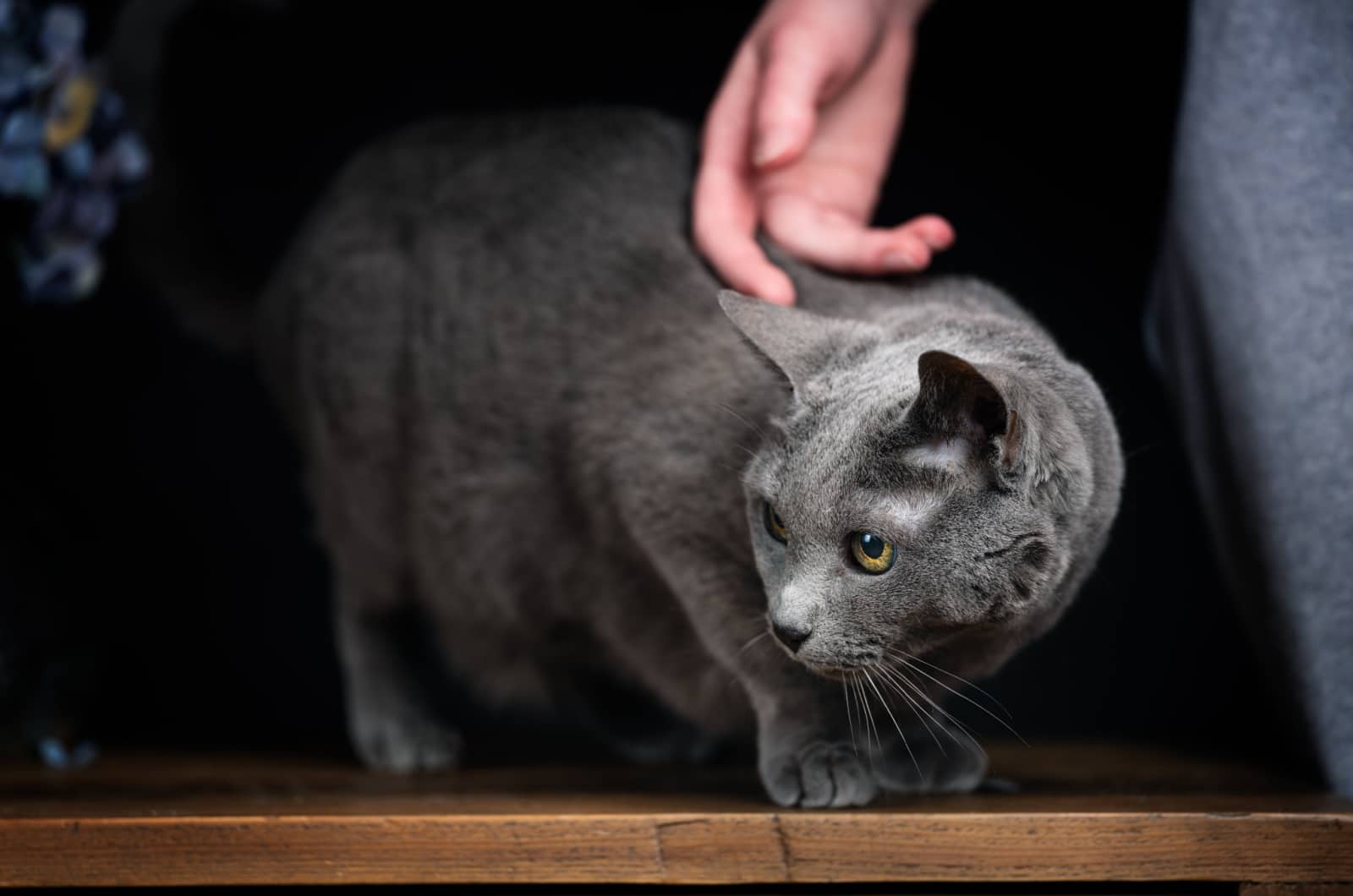
Allergy-prone people have an oversensitive immune system that overreacts to harmless substances. Overreaction means unnecessarily producing many antibodies that will fight off the substance, leading to side effects such as sneezing, runny and stuffy nose, wheezing, red eyes, etc.
In the case of people allergic to cats, the substance their immune system mistakenly treats as a harmful invader – is glycoprotein Fel D1.
It’s a common misconception that cat hair causes this allergic response, but it is not.
People with cat allergies are allergic to the protein Fel D1, which is found in:
• Cat’s hair
• Cat’s saliva
• Cat’s dander
• Cat’s urine
See also: Are Bengal Cats Hypoallergenic? Here’s What You Need To Know
Fel D1 – The Cat Allergen
Fel D1 is a protein produced in the cat’s saliva, the sebaceous glands found in the cat’s skin, and the anal glands.
When cats groom themselves, they transfer their saliva onto their hair, meaning you will find Fel D1 in the cat’s hair. Cat dander (flakes of skin) contains Fel D1 due to the sebaceous glands secreting this protein on the cat’s skin.
It’s interesting to note that the function of this protein in cats is still unknown, but we know that it causes excessive production of antibodies G and E in sensitive humans.
Some Cats Produce Lower Amounts Of The Cat Allergen
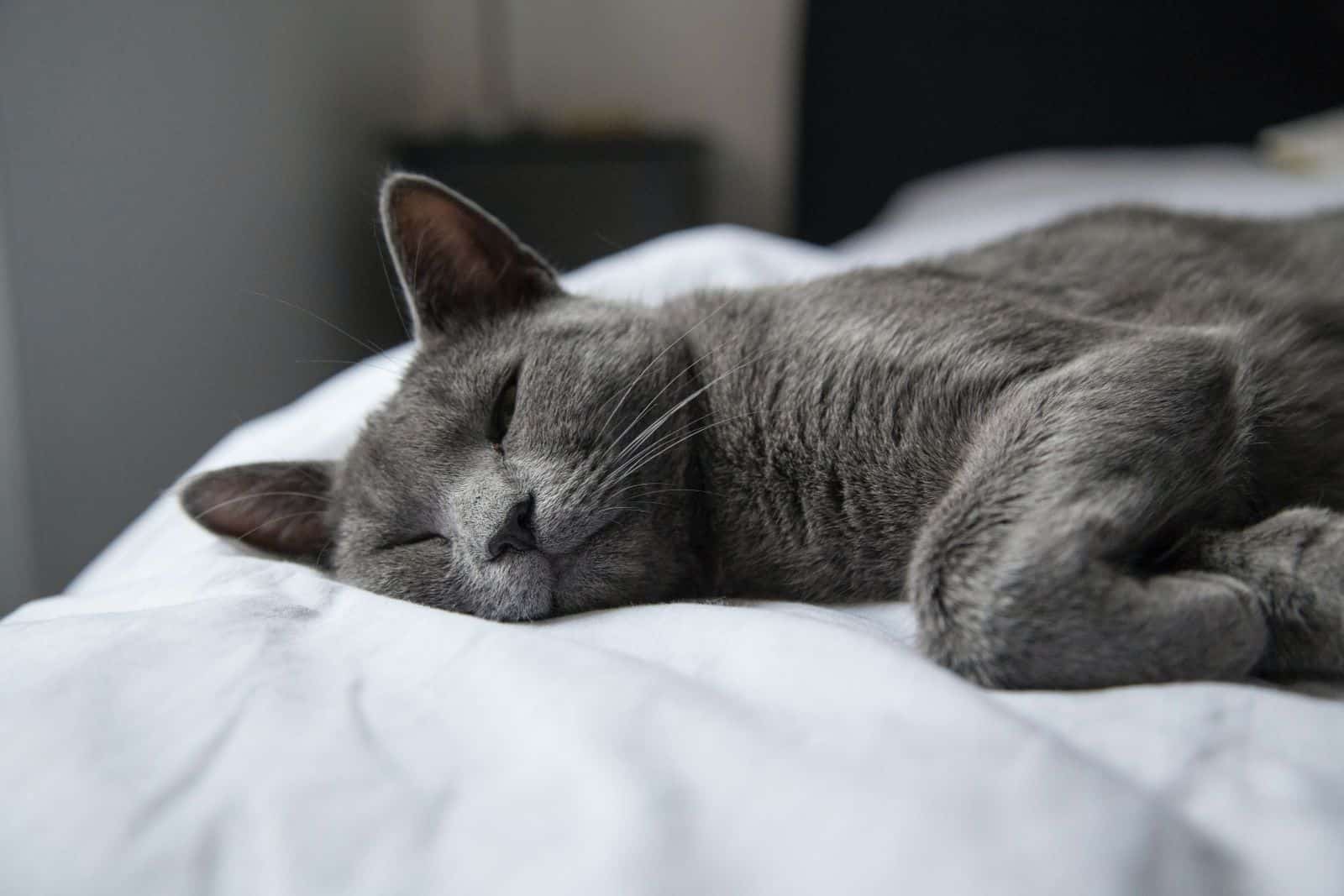
A 2018 article on molecular cat allergens summed up essential information regarding the production levels of Fel D1:
• Adult cats produce more cat allergen than kittens.
• Unneutered male cats produce more cat allergen than neutered male cats.
• Neutered male cats produce the same amount of cat allergen as female cats.
• There is no difference in the level of production of cat allergen of spayed and unspayed female cats.
It’s interesting to note that levels of Fel D1 differ in different cat body parts. For example, a cat’s head contains much more of this protein than other body parts!
The Elite Hypoallergenic Cat Breeds List
Some cat breeds have a genetic predisposition to produce lower levels of Fel D. Those cat breeds would be the Balinese and Siberian cats.
Other cat breeds commonly believed to cause only mild allergic reactions are:
• Sphynx
• Russian Blue
• Cornish Rex
• Devon Rex
• Burmese
• Oriental shorthair
• Siamese
• Korat
• Javanese
These breeds of cats are a good choice for allergy sufferers whose symptoms are not so severe. However, for allergy sufferers whose symptoms are very severe, no cat is a good choice, unfortunately.
Suggested: Are Maine Coons Hypoallergenic? Yes & No – Here’s Why
How Do I Know If Russian Blue Is A Good Fit For Me?

If you’re suffering from cat allergies but are also a passionate cat lover, you might wonder if the Russian Blue cat is the perfect cat for you.
The Russian Blue cat is a good fit if your allergy symptoms are mild. However, if your symptoms are severe, I suggest not having a cat.
If you’re extremely sensitive to cat allergens, every cat will cause an allergic reaction in your body, no matter the cat breed.
Therefore, if your allergies are mild, and you keep up with the good practices explained below, you can lead a lovely life with your furry friend.
However, if your life will be plagued by constant bouts of sneezing and not breathing properly, having a cat is not worth it.
Spend A Day With A Russian Blue
You cannot know if a cat will cause allergic reactions until you spend some time around that cat!
If you know someone that owns a Russian Blue cat, I suggest asking them if you can come over to spend some time with their cat (and them). I know this seems a bit odd, but it’s the only way you’ll learn if you’re severely allergic to Russian Blue cats or not.
If you find out that Russian Blue cats cause severe allergy symptoms, that is a sign that a Russian Blue is not a good fit for you.
It’s better to learn how your body reacts to the presence of a cat than to adopt a cat and discover that the cat causes you severe allergy symptoms. Then, you’ll have to part ways with the cat, even though you badly wanted to be a cat owner.
To conclude; find a Russian Blue cat owner and ask if you can spend some time with them and their kitty. Explain why you want to do this, and I’m sure they will invite you for a cup of coffee in no time!
Suggested: Are Calico Cats Hypoallergenic? Everything You Need To Know
Waiting It Out Does Not Work
Let’s say you’ve got a Russian Blue cat or spent some time with your friend’s Russian Blue cat. Either way, you’ve learned that, unfortunately, your allergic reaction is quite severe. What do you do now?
I will tell you what does not work – “waiting it out.” Maybe you think It’s okay; the allergy symptoms will disappear after my body is used to the presence of this cat. I’m sorry to say that allergies do not work that way.
Even if you spend considerable time with the cat, your allergies will still be triggered. Your body will not “get used to the presence of the cat” but instead, cause an allergic reaction every time it encounters a cat allergen (which will be all the time if you live with the cat).
If you have a pre-existing condition, such as asthma or similar health issues, you should not risk your health to own a cat!
But What If My Allergy Symptoms Are Only Mild?
If you learn that the presence of Russian Blue only causes a mild allergic reaction, consider yourself lucky!
Many people who are only mildly allergic to cats can lead a perfect life with their feline pets. How so? They learn how to efficiently minimize their symptoms and apply good practices every day.
What are those good practices? Below is an entire section dedicated to it! If you feel like you can apply them daily, then I suggest you start looking into some Russian Blue cat names, as it seems you’ll be having a new pet around your house!
15 Ways To Minimize Cat Allergy Symptoms

Cat allergies can be managed by introducing changes in your habits and environment. Although they might be annoying to follow at first, they will eventually lead to your symptoms being as mild as they can get, which is your goal.
Therefore, if you’re mildly allergic to cats and want to be a cat owner, follow the guidelines below!
1. Wash Your Hands After Petting Your Cat
When you pet your cat (especially around its face and head), you’ll have allergens on your hands. If you touch your nose, you’ll directly expose yourself to the proteins that cause allergy symptoms.
To limit your exposure to the allergens, wash your hands to get rid of the sneeze-causing proteins!
2. Don’t Let Your Cat Lick You Too Often
I know this is a bummer, but a cat’s saliva contains many cat allergens, which are then directly transferred to you via licking. When your cat starts to lick you, redirect its attention to something else.
This might be hard to do, as Russian Blue kittens (and adult Russian Blues, too) love to cuddle and are quite affectionate, but you should still do it.
3. Vacuum Often
Vacuuming a few times a week will reduce the amount of cat hair and dander in the home.
If your allergy symptoms are more severe, I suggest having someone else vacuum, as vacuuming increases the number of airborne allergens.
4. Dust Often
Dusting is an easy way to minimize airborne cat allergies, by as much as 95%.
Spray furniture polish directly on the dust before dusting, as this is the most effective way of getting rid of the allergen, as it tends to stick firmly to surfaces.
5. Groom Your Cat Regularly

Although you already know that you should groom your cat, I need to point out how important this is, especially for allergy sufferers!
Regular grooming prevents loose hairs from ending up everywhere in your house, efficiently reducing the amount of cat allergen in the house.
6. Neuter Your Male Cat
Unneutered male cats produce a significantly higher amount of the cat allergen Fel D1 than neutered male cats. Therefore, to lower your exposure to the allergen, neuter your male cat.
Apart from neutering your cat to lower your allergy symptoms, neutering brings other benefits to you (the cat’s urine will not have a strong smell anymore), and for the cat too (such as lowering the risk of prostate and testicular cancer).
7. Own One Or Two Cats Only
To remind you, I want to point out that having one cat and having five cats is not the same if you’re an allergy sufferer. With every “extra cat” you own, you’re exposing yourself to “extra allergen”, meaning your allergy symptoms can worsen if you decide to own more cats.
8. Don’t Let Your Cat Spend A Lot Of Time In Your Bedroom
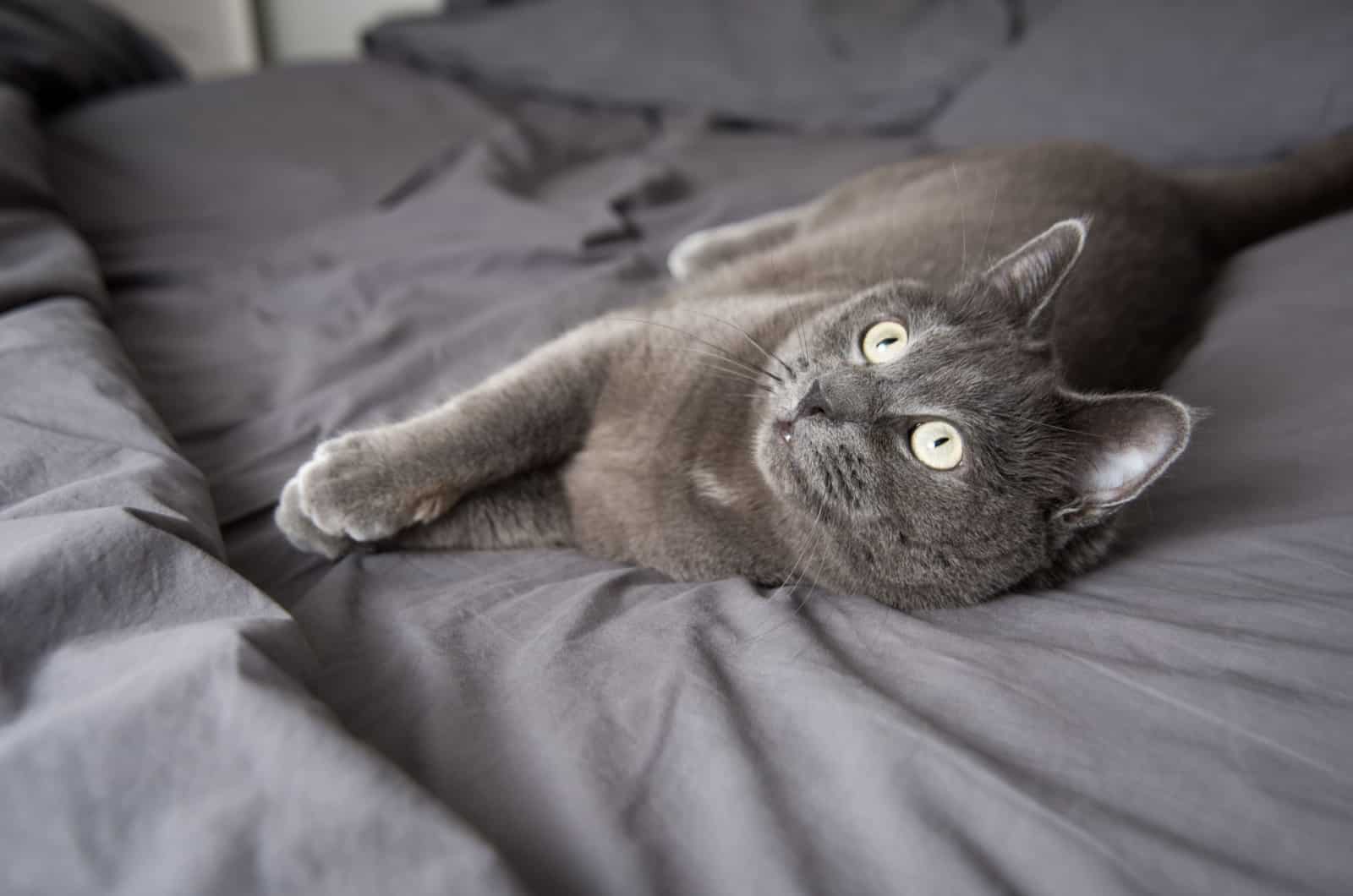
Your bedroom is a place where you spend a considerable amount of time. Because of this, you want this room to have as little cat allergen as possible. Reduce the amount of airborne cat allergens by limiting your cat’s time spent in the bedroom.
How do you do this? Teach your cat not to enter your room (this should be easy as Russian Blue are intelligent cats), or keep the door shut.
9. Smooth Wood And Tiles Are Better Than Carpets
Carpets are known to hold onto everything that lands on them, including cat hair and dander, which contains the cat allergen. Therefore, carpets will have more cat allergen than smooth flooring, which is easier to clean.
In fact, smooth floors contain 13 times less cat allergen compared to carpets!
10. Get Someone Else To Clean The Cat’s Litter Box
Your cat’s litter box contains more cat allergens than most other items in the home. Cat’s urine is known to contain Fel D1, the cat allergen. Cat hair and cat dander will also be present in the litter box.
Because of the high concentration of the allergen in the litter box, you should hand over the litter box cleaning duty to someone else (for example, a family member or one of your housemates)!
I recommend buying low-dust cat litter, as it’s the best option for people that don’t want allergen-carrying dust in the air!
11. Invest In HEPA Filters
HEPA vacuums with micro-filtration are air purifiers that will efficiently reduce the number of airborne allergens in the room. If your cat spends most of its time in the living room, install the HEPA filter in the living room.
These filters are known to reduce allergen concentration in the air up to seven-fold!
12. Use High Temperatures For Washing Textiles
Using high temperatures when washing your clothes, couch covers, bedding, cat beds, and rugs is recommended. Why? Because high temperatures are more efficient in destroying the protein that causes allergic reactions.
13. Bathing Your Cat Can Help
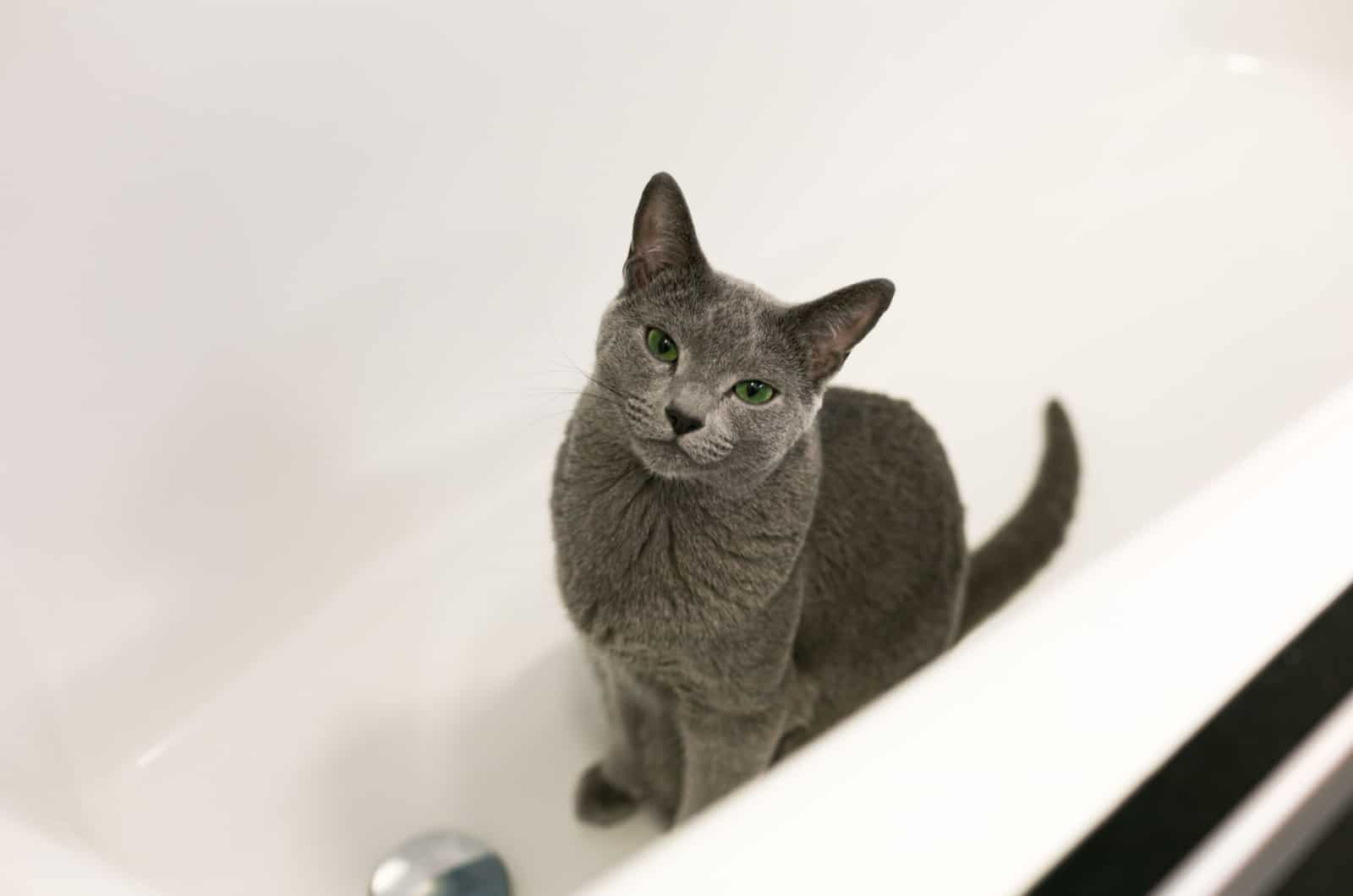
Although bathing your cat is not a permanent solution, it’s still an efficient way to lower the amount of cat allergen found on the cat’s fur and the surface of the skin. Make sure to use only cat-friendly shampoos!
Check Out: Best Cat Shampoo Alternatives: No More Bathing Nightmares
14. Controlling Your Cat Allergy With Medication Is An Option
There are several strategies for managing allergies medically, when minimizing allergen exposure is insufficient.
Over-the-counter medications will provide you with allergy relief for symptoms including runny/itchy nose and throat, sneezing, and itchy/watery eyes. Antihistamines and decongestants are common medications among allergy sufferers.
In Conclusion
Are Russian Blue cats hypoallergenic? Yes, Russian Blue cats are considered to be hypoallergenic. Along with some other hypoallergenic breeds, such as the Sphynx, Cornish Rex, and Devon Rex, they produce a lower amount of cat allergens compared to other cat breeds.
If you’re thinking about getting a Russian Blue cat, it is advisable to first spend some time with that cat before deciding on adopting/buying it from a breeder. By spending some time with a Russian Blue, you’ll know if your allergy symptoms will be manageable.If you’re mildly allergic to Russian Blue cats, that’s excellent news.
If you follow some guidelines about how to live with a cat if you’re cat-allergic, you can be one pleased can owner!
Like this post? Share or pin it for later!
